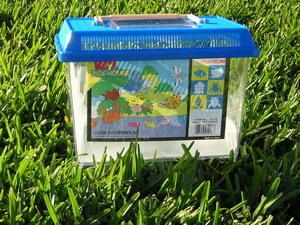 |
| Sick parrot? |
Therefore, it has no perches they must balance on- it is a small enclosed space with a flat bottom. It is soft on the bottom (towels are great for this). It has easy access to food & water, and is kept warm on one half of the enclosure (one half, so that if the bird feels overheated, it can self-regulate by going from one end to another).
If you have birds, you need to have one of these already. You don’t want to be unprepared in an emergency and have to leave your bird in critical condition while you search for one at the 24 hour pet store (is there such a thing?).
For small birds, a “critter keeper” (used to temporarily house hamsters, mice or tarantulas) works very well. For medium birds, a small cage with perches removed is good and for large birds, a large dog kennel or rubbermaid storage bin works well.
(Here’s what a critter keeper looks like):

Things you must have for your hospital tank:
1. heat source.
Half of the hospital tank is warmed by a heating pad (outside the cage, not in) or a ceramic or infared heat bulb. It is important to keep sick or injured birds at least 85-90 F (29- 32 C). The other half is kept at room temperature, so that they can regulate their own temperature by walking from one side to another. Be sure and monitor the temperature on the warm side. Sometimes things get a little too hot, especially if the heat source is directly touching the tank. Panting is a sign that they are overheated and you should try a different method or turn it down.
2. easy access to food and water.
I use small heavy shallow ceramic crocks in my hospital tanks. They do not easily tip over and are easily accessed by a sick bird.
3. towels.
Clean ones to change on the bottom (note: pick tightly woven discloths rather than looped terrycloth for small birds- their tiny talons get caught in the loops, causing them to fall and struggle) and one to drape over part of the tank to calm the bird down.
4. food- any food that the bird will eat.
Now is not the time to be persnickety about avian nutrition. A bird can take a serious nosedive if not eating when sick or injured.
Think: they poop about every 15-20 minutes. Their metabolisms are really fast. They need a constant source of high energy food. So if your bird won’t eat their regular nutritious diet, lure them with something they love but isn’t all that great nutritionally- millet spray, peanut butter, avi-cakes, whatever!
If your bird is really going downhill fast and needs a last minute boost as you are taking them to the vet, strong black coffee with sugar, administered with a dropper or syringe can make the difference between life and death. This is not something you would normally give them, as it is hard on the organs, but it can kick start their metabolisms in an emergency.
Now through 10/18, enter code hospitaltank to get free shipping on your order when you get $50 in toys.

No comments:
Post a Comment